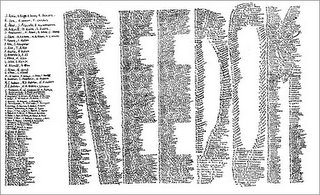On October 26, 2006, the AJC staff cartoonist, Mike Luckovich published this cartoon to commemorate the 2,000th American death in Iraq.  At the time I thought it a pretty cheap and tasteless rhetorical trick, yet fairly indicative of the media's addiction to numbers and death. Some of my strongest memories of 9/11 and Katrina are those concerning the media's grotesque obsession with numerical estimations. It was as though the disaster wasn't complete until an exact number was determined. If my memory is correct, (I said my memory was strong, not accurate), then the highest estimations reported by the media for 9/11 were 40,000 and the highest for Katrina were "over 10,000". The networks fell over each other in competing to find the highest estimation they could from someone, anyone in fact. If someone said it, they reported it and let it crawl across their banner every ninety seconds: "40,000 may be dead."
At the time I thought it a pretty cheap and tasteless rhetorical trick, yet fairly indicative of the media's addiction to numbers and death. Some of my strongest memories of 9/11 and Katrina are those concerning the media's grotesque obsession with numerical estimations. It was as though the disaster wasn't complete until an exact number was determined. If my memory is correct, (I said my memory was strong, not accurate), then the highest estimations reported by the media for 9/11 were 40,000 and the highest for Katrina were "over 10,000". The networks fell over each other in competing to find the highest estimation they could from someone, anyone in fact. If someone said it, they reported it and let it crawl across their banner every ninety seconds: "40,000 may be dead."
With the war in Iraq, the numbers game continues. Every day that an American is killed in Iraq, the fact is reported and the tally updated. I see nothing wrong with the report of the death if the appropriate context is given, which it rarely is, but the running tally reveals either a macabre, Rainman-like obsession with numbers or an acute editorial bias. The phenomenon sadly reminds me of the overly cheerful public TV/radio telethons, "Wait, Doris, a caller from Fallujah is pledging three more deaths! That only puts us four more under our goal for the year. Come on terrori...I mean insurge....I mean Freedom Fighters. I think we can reach our goal of 2,000 dead before the hour is up. Plant those IEDs, strap a bomb to your wife and kids, and go shopping!" It's disgusting.
I am vaguely reminded of Dr. Strangelove, a movie about very different types of obsessions. The general, "Buck" Turgidson" and played by George C. Scott, is obsessed with "the big board". The big board so obscures his thinking that he cannot make rational decisions or see the obvious beyond the big board. The board provides some great comedic moments; I can still hear Scott's particular way of pronouncing it. Numbers in Iraq have become the Media's big board. Like the tally board on a telethon, they cannot see anything of significance beyond the numbers. Luckovich's cartoon only underscores that sad truth. He asks the question "Why?" with the names of the 2,000. Never mind that the large majority of those 2,000 knew the answer. Luckovich's own newspaper reports the answer despite itself at least every few weeks. How many elections do the Iraqis have to hold, how many constitutions do they have to write, how many of them have to lay down their own life defending their new nation? Where is the tally of Iraqis who have paid the last full measure fighting for their new government? A seventeen year old, Danielle of Fairburn, Georgia, and an 11th-grader at Arlington Christian School provides the obvious answer to Luckovich's question:

Luckovich should feel like I did the day I was caught stupid the first time I taught American government. We were discussing the three branches and the differences between the House and Senate. A student asked how many members are in the House. I confessed that I didn't know. The student continued to expose my ignorance by asking if the number was set constitutionally. I opened my mouth, unsure whether to lie to cover myself and hope for ignorance on the part of my students or further confess my own ignorance (note to new teachers: confess your own ignorance). Another student stepped in, "Actually, there are 435 members of the House, and the number is set by statute." That night I went home and did my homework and have never been caught quite so stupid again. Mr. Luckovich needs to do his homework. I credit him with responding to Danielle's cartoon, but I think that for him, there is still no answer for the question. For Luckovich the war remains pointless and the dead died in vain.
I think it is appropriate and necessary to ask the question, "Why?" about any public endeavor, including the decision to go to war. But to continue to ask it after the answers continue to pile up is ignorant. You didn't hear people asking, "Why?" in 1943. Or "Why?" in 1780. They knew. They knew that: "THESE are the times that try men's souls. The summer soldier and the sunshine patriot will, in this crisis, shrink from the service of their country; but he that stands it now, deserves the love and thanks of man and woman. Tyranny, like hell, is not easily conquered; yet we have this consolation with us, that the harder the conflict, the more glorious the triumph. What we obtain too cheap, we esteem too lightly: it is dearness only that gives every thing its value. Heaven knows how to put a proper price upon its goods; and it would be strange indeed if so celestial an article as FREEDOM should not be highly rated." Duh! It's the Freedom Stupid.
I wish that I could claim Danielle as my student. Follow the links to read more, including Danielle's letter, but free registration might be required.
Peace

No comments:
Post a Comment